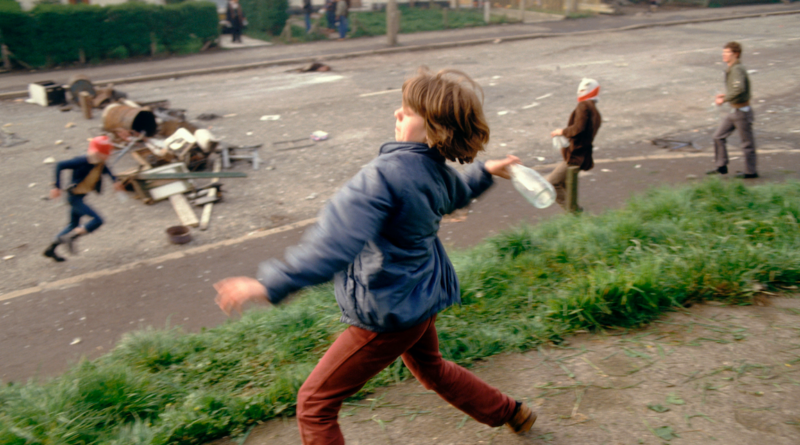INTERVIEW: Conflict comes into focus in ‘Once Upon a Time in Northern Ireland’ on PBS
Photo: Anne Marie, aged 10, throws a bottle at British troops during a riot in Belfast, Northern Ireland, in 1981. Photo courtesy of © Peter Marlow / Magnum Photos / Provided by PBS with permission.
Once Upon a Time in Northern Ireland, the new five-part miniseries that kicks off Monday, Aug. 28, on PBS, tells the story of the violent conflict that plagued Northern Ireland during the so-called Troubles, a time period that saw Protestants and Catholics fighting against each other about their relationship to the United Kingdom and Ireland. Director James Bluemel doesn’t take sides when detailing the fractious debates and deadly events, instead choosing to give voice to the many different people impacted by the political struggle and violent aftermath. This expansive TV project offers multiple viewpoints and various threads to the complicated and often sad story of Northern Ireland in the 1960s, 1970s and onward.
For Bluemel, who also directed Once Upon a Time in Iraq, one of the key challenges of this miniseries was how to take the Troubles and distill the most important chapters into five hours of television.
“I can’t attempt to be definitive about what I cover,” Bluemel said in a recent Zoom call with journalists. “I have to make sure that there is an internal balance within the series. That’s important, and also that the emotional journey doesn’t become repetitive. If a conflict goes on for 50 years, 30 years, 40 years … and you’re trying to cover everything, you are going to hit very similar emotional tones. So it was trying to work out what key events we should be looking at and where those key events need to balance, but the way these films work, the most important element is the cast.”
For example, when Bluemel wanted to cover Bloody Sunday, a day that saw 13 unarmed Catholics shot dead in Derry by British paratroopers, he sought out people who actually lived the events. “I look at those events and try to find people that were there,” he said. “Other times I can just come across somebody who I think is brilliant, and they say, ‘Oh, my life took me to this event.’ And I think, well, that’s a good reason to go to that event then, so it’s a combination of solid timeline research and serendipitous talking to people and finding your cast that way.”
In many ways, Bluemel and his team had the unenviable responsibility of presenting the facts involved in the Troubles without taking sides or offering any preconceived notions. To this day, the conflict is debated and fraught with sectarianism, which makes any project looking back at the impact of the events quite the quagmire to wade into. Although, thankfully, the peace accords have mostly held firm for the past 30 years, and the widespread violence has ended.
“Depending on your viewpoint, you’re right, that person can either be a freedom fighter or a terrorist,” Bluemel said. “That’s true if you’re an IRA soldier, if you’re a British soldier or if you’re a Loyalist soldier. They all occupy that same conflicting dichotomy of identity depending on the point of view, and the way that I navigated that was to leave any sort of judgment or prejudice, leave that behind. I’m not trying to make a judgment on the choices they made. I’m trying to understand why they made the choices they made.”
Bluemel said he was after the “journey” of his real-life cast members, and if he could explain that journey with empathy, trying to let the audience comprehend how someone could end up in such a position, then perhaps there’s not acceptance, but better understanding of how the Troubles came to be.
“That’s the point of the documentary,” the director said, “for someone from one community to see the other community for the first time with a bit of understanding and a bit of empathy. … That fairness and level playing field that I tried to provide for everyone, where they can start to explain their stories, I think that’s important for the series.”
There’s a visceral, visual element to Bluemel’s nonjudgmental storytelling. In Once Upon a Time in Northern Ireland, the interviewees offer their testimonials in a central chair in a darkened room. There’s poignancy to this setup: Everyone comes into that space to talk. “Everyone is coming from the same place, especially at the very beginning,” Bluemel said. “People aren’t born sectarian. That’s all learned behavior. If we can see those journeys and understand those journeys, perhaps we will understand why those things happen, and if you understand why those things happen, you can begin to confront them in a way which stops them being as powerful as they are, stops them being immovable forces, to see beyond that, beyond the ideology.”
By John Soltes / Publisher / John@HollywoodSoapbox.com
Once Upon a Time in Northern Ireland, directed by James Bluemel, premieres Monday, Aug. 28, at 9 p.m. on PBS. The five-part series continues with episode two at 10 p.m. Click here for more information.

